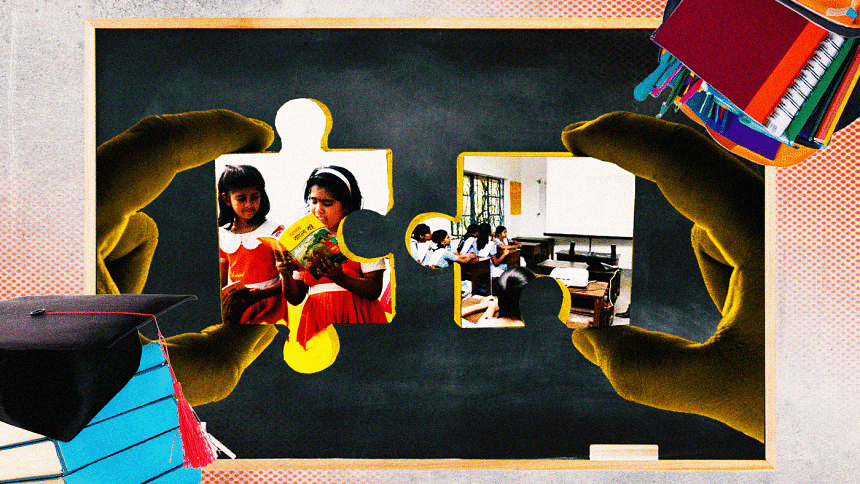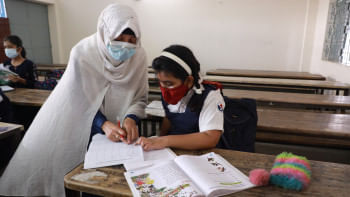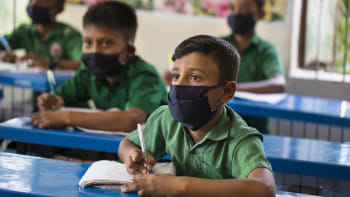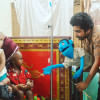How to bridge the rural-urban education divide in Bangladesh

The rural-urban education divide is evidently increasing in Bangladesh. Combating this inequality demands comprehensive initiatives that must be launched with proper planning and monitoring. To solve the problem and find the root cause, we need data and research.
The education ministry must build and demonstrate strong policy leadership to reduce the rural-urban divide. Currently, most activities are designed by the central authorities. According to 2022 data, of the total 21,003 institutions in Bangladesh, 19,424 schools and colleges are located outside city corporation areas. It is tough to monitor such a huge number of schools by the central authority. Power devolution to district and upazila levels with strong central monitoring, evaluation, and policy reformulation is advised. The task can be delegated to the existing institutions or bodies such as any government institution, local government, or head of another department in the upazila or district.
The education ministry and/or Bangladesh Bureau of Educational Information and Statistics (BANBEIS) should release performance and enrolment data disaggregated based on rural/urban location, broken down by upazilas and districts so that researchers and policymakers can better analyse the disparity and suggest a way out. They need to identify problems such as the poor performance of rural students, conduct research on how to tackle these challenges, and take necessary actions urgently.
The new curriculum is aimed at fostering curiosity, critical thinking, and a growth mindset among students. However, rapid changes of curriculum disproportionately affects rural students, whose education base is already weak. Whatever change we introduce, we have to ensure that it does not negatively affect any group. In this situation, there needs to be annual evaluation and evidence-based research by third parties so that the shortcomings of the curriculum can be overcome.
Teacher recruitment in schools needs to be competitive. A lucrative package for teachers is essential so that qualified candidates are attracted to school teaching. Singapore is often cited as one of the best places for teachers in Asia, in terms of high salaries, excellent working conditions, and supportive policies. The benefits of these are evident. They consistently rank at the top in international assessments like the Programme for International Student Assessment (PISA). If we want to see good students and build a smart and developed Bangladesh, we have to recruit and retain good teachers and compensate them properly.
Teacher training needs to be strengthened. Some visionary teachers in rural areas teach beyond their teaching levels and create an everlasting impact in the minds of their students. Local governments or local administrations can organise subject-wise peer training programmes by these teachers. Presently, teachers mostly go to urban facilities to attend training sessions. Contrary to this conventional approach, organising training in the respective rural institutions can enhance quality standards while concurrently mitigating expenses.
Distance learning programmes can be implemented to provide access to transformative education to students in rural areas. Winter workshops can be arranged to harbour maths and English skills. Proficient educators from both rural and urban areas can go to rural schools and equip the students with subject-specific knowledge and practical skills. These are excellent and proven mechanisms to help rural students.
Community engagement and partnerships between schools, local communities, and businesses to support educational initiatives in rural areas are conducive. This could include establishing mentorship programmes, organising community events, and providing extracurricular activities to enrich the educational experience of rural students. There needs to be synchronisation among alternative education systems, such as madrasa and English medium education, so that there is equal employability and no cultural de-alienation.
In the educational landscape, three primary stakeholders play pivotal roles: teachers, parents, and students. Alongside policy initiatives, these groups have to shoulder significant responsibility in mitigating the rural-urban education divide.
Teachers should instil in students a variety of qualities and skills such as a love for learning, critical thinking, and communication skills. Teachers are not just teachers; they are also leaders. They must develop versatile pedagogical approaches that cater to diverse learning styles and needs. They can leverage online platforms, educational apps, and digital content to enrich their teaching materials and facilitate interactive learning experiences.
Parents and guardians must play a crucial role in monitoring and guiding their children. Awareness-building workshops for parents are advised so that they are aware enough to nurture every aspect of their child's development. Parents must actively participate in their child's education by motivating their children to be self-sufficient and responsible. They should also oversee their children's online activities and help to create a healthy balance between screen time and other recreational and educational pursuits.
Rural students should be guided to identify the boundaries in their knowledge and skills and work on them accordingly. They need to be shepherded to dream big and be taught that actively participating in the learning process and demonstrating self-discipline, resilience, and a willingness to explore and learn will take them closer to that dream. We need to develop proactive students who take ownership of their education and help their peers with academic enhancement as well.
The major resource of Bangladesh is human resources, and we need to fully utilise them to navigate the challenges of the next hundred years. According to the 2022 census, 68.34 percent of our population resides in rural areas. If we cannot develop human capital from this huge population, we will lag in skills, technology, innovation, and productivity. Closing the rural-urban disparity in education will improve the overall skill level of the population, contributing to economic growth and inclusive development. Above all, we have to create citizens who will not only be properly educated in science, skills and culture, but also have high morals, values and a strong sense of patriotism.
Dr Mohammad Tareque is director at the Bangladesh Institute of Governance and Management (BIGM), former finance secretary, and former alternative executive director at the World Bank.
Tasfia Tasneem Ahmed is research associate at the BIGM.
Views expressed in this article are the authors' own.
Follow The Daily Star Opinion on Facebook for the latest opinions, commentaries and analyses by experts and professionals. To contribute your article or letter to The Daily Star Opinion, see our guidelines for submission.

 For all latest news, follow The Daily Star's Google News channel.
For all latest news, follow The Daily Star's Google News channel. 











Comments